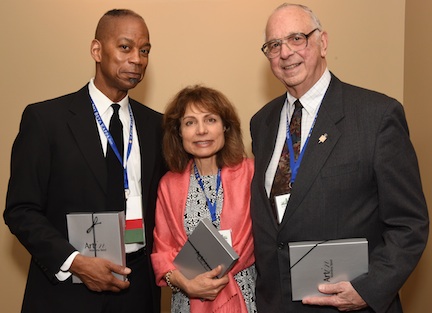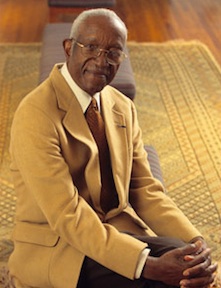By Melanie Ojwang
Phi Beta Kappa’s fist John Hope Franklin Award was presented to Bette Napoli Harris, James Lightner, and Don Wyatt at the 44th Triennial Council, held in Denver this fall. Created in 2011 to honor distinguished historian, author, and 18th President of Phi Beta Kappa John Hope Franklin, this award honors individuals for especially meritorious service to the Society.
Bette Napoli Harris
Bette Napoli Harris’ commitment to ΦBK spans over 30 years. She served as President of the Northern California Association in 1987, Chair of the Western District, Chair of the Conference of Association Delegates, and served two terms on the Committee on Associations. Some of her most rewarding experience, Harris recalls, has come from “the opportunity to interact with Chapter and Association representatives to find solutions to common problems.”
Still active on the Southern California Association Council, Harris looks forward to preserving the legacy of the group, which will soon be celebrating its centennial. Among its other activities, the Association raises scholarship funds for disadvantaged youth, a cause Harris believes can help them gain a higher education that will “have a profound effect in changing the trajectory of their lives,” she explained. She particularly enjoys meeting the recipients of these awards, such as those at Theodore Roosevelt High School in East Los Angeles. For 15 years she has had the honor of presenting awards and “witnessing the zealous school spirit and excitement,” Harris notes, a part of her work that inspires her optimism for the future.
In presenting these scholarships, Harris is also able to communicate what ΦBK represents, that wisdom is the guide to life, a message that Harris truly believes in. “Liberal learning makes life more meaningful for me,” she said, and she has always felt that her involvement in ΦBK is a “collaborative experience…not a competitive one.”
“I have met many wonderful individuals through ΦBK, and was fortunate to have found mentors who motivated me and encouraged me to take on leadership roles,” Harris said. “I never felt ‘stuck’ or alone with these responsibilities; rather, I felt I was in partnership with them.”
All three recipients had the honor of meeting John Hope Franklin at Triennials in the past. Harris describes him as having been “warm, approachable, and [having] a great sense of humor.” She was impressed by his brilliance as well as his lack of bitterness or resentment “despite having suffered much bigotry and intolerance over the course of his life,” she added.
James Lightner
James Lightner, historian and professor emeritus at McDaniel College, was instrumental in the founding of the Delta of Maryland Chapter at McDaniel in 1980 and remained involved with its administration until his retirement. He is proud to describe ΦBK as a “very fine organization that stresses the liberal arts” and one that does a “better job of broadening students.”
In addition to his long record of service with the McDaniel chapter, Lightner was elected Chair of the Committee on Chapters in 2006 and later became a member of the Executive Committee, expanding the scope of his work for ΦBK to the national level.
Receiving the John Hope Franklin Award was a great honor, Lightner said, but he would have to choose chairing the Committee on Chapters and serving on the Executive Committee as his favorite ΦBK honors. As part of these committees he helped craft the rubric used to evaluate applicants for new chapters.
Lightner has more than lived up to his moniker as a “champion of chapters” by bringing their concerns to light as well as developing alternatives to how chapters could be more helpful and inviting, such as working to produce a new brochure for potential student members. He stated that there is “a lot of behind the scenes work to keep the chapters functioning” but that he enjoyed all of it.
Like Harris, Lightner had the pleasure of meeting former ΦBK President John Hope Franklin, describing him as a “stately gentleman, softspoken…not at all suggestive of [his] eminence.” Lightner was awed to meet Franklin and found inspiration in his impact, which Lightner said “raised the level” of liberal arts education.
Lightner continues to be active within the McDaniel College community, serving as the school’s Historian and as a member of the college’s Board of Trustees. When he is not dedicating his time to ΦBK or McDaniel College, Lightner can be found at his local Rotary Club, historical association, or singing in his church choir.
Don Wyatt
A vital asset to the Beta of Vermont Chapter at Middlebury College, Don Wyatt has presided as the chapter’s president for the past 25 years. At the national level, Wyatt has served as a Phi Beta Kappa Senator, Chair of the Committee on Awards, and a member of the Committee of Qualifications, which examines the universities and colleges applying for a chapter.
For Wyatt, it is hard to settle on one favorite position or activity from his years of working with the Society. Serving as Chair of the Committee on Awards, he was “tasked with the joyful role of publicly conferring major tributes ranging from the three book awards to the Distinguished Service to the Humanities and the Sidney Hook Memorial awards on the most eminently deserving scholars,” Wyatt said. As part of ΦBK at Middlebury, he also had the “pleasurable honor of officiating at more than fifty inductions,” he explained.
Active at many levels in the Society, Wyatt “always felt compelled to regard [his] inclusion in the ranks as an opportunity and to act on it rather than regard it passively,” he explained. “Education is a life-long process and that it is also a project that one never really completes,” he added. “The more literal one is in regarding this truism as a reality, the more dedicated in its service one will be.”
When considering the man for whom the award is named, Wyatt focused on two of Franklin’s prominent traits. The first was his “faith in the liberating power of education,” Wyatt said, which was manifest in Franklin’s ability to “surmount the undisguised racism he confronted in his early adult life.” The second trait was, Wyatt observed, “an uncommonly stubborn belief in the human goodwill.”
During the Society’s 39th Triennial Council in 2000, the University of Mississippi was a candidate institution to be voted on for chapter status. Despite the school’s “notorious legacy of education racism,” Wyatt recalled, Franklin “rose without solicitation and spoke unscripted and passionately in favor of the candidacy of Ole Miss.” Wyatt remarked that “[Franklin’s] argument that the institution was now poised to move beyond its racist past was both profoundly persuasive and unforgettable.”
A specialist in East Asian history, Wyatt is currently on sabbatical conducting research he hopes will be “a final way of acknowledging the influence of John Hope Franklin.” A portion of his project, Wyatt explains, will investigate the “earliest Chinese notions and descriptions of racial and ethnic identity—their own as well as those of various other peoples encountered, including some—such as Africans—for the first time.”

L-R: Don Wyatt, Middlebury College; Bette Napoli Harris, Southern California Association of Phi Beta Kappa; James Lightner, McDaniel College.
Melanie Ojwang is a senior at McDaniel College majoring in English and sociology. McDaniel College is home to the Delta of Maryland Chapter of Phi Beta Kappa.




